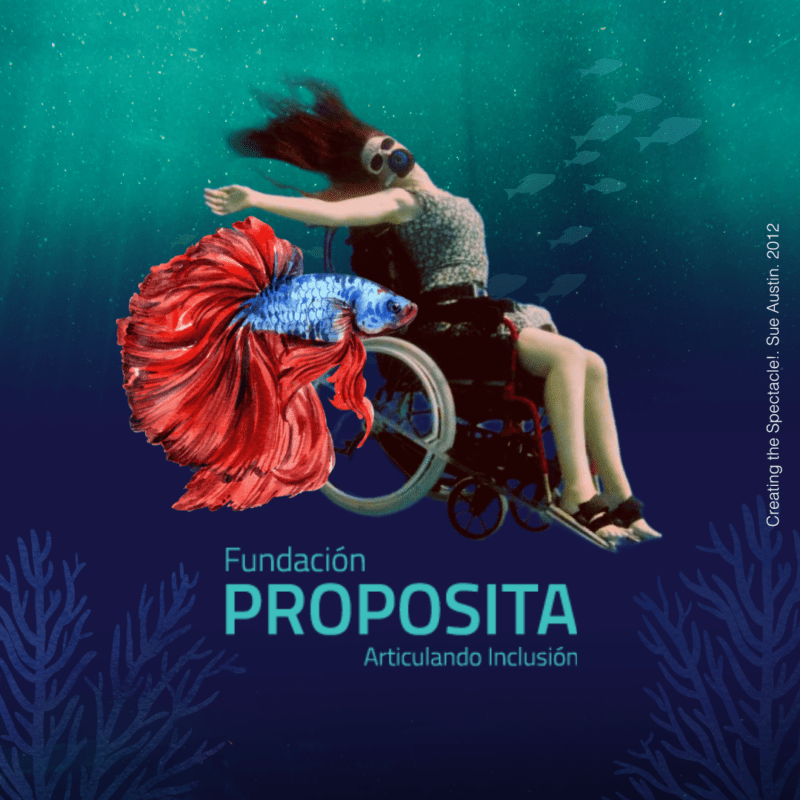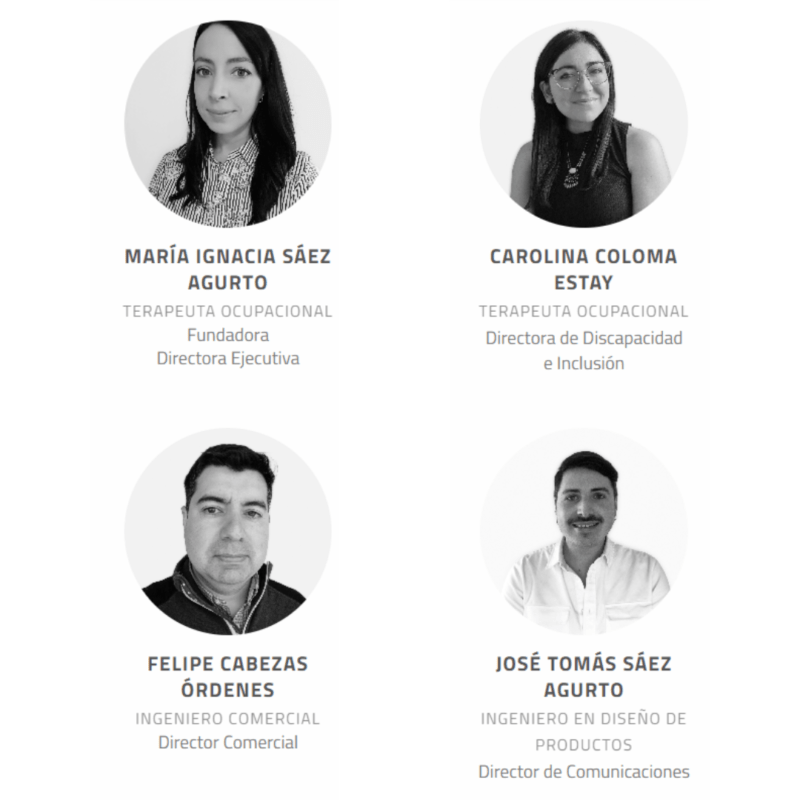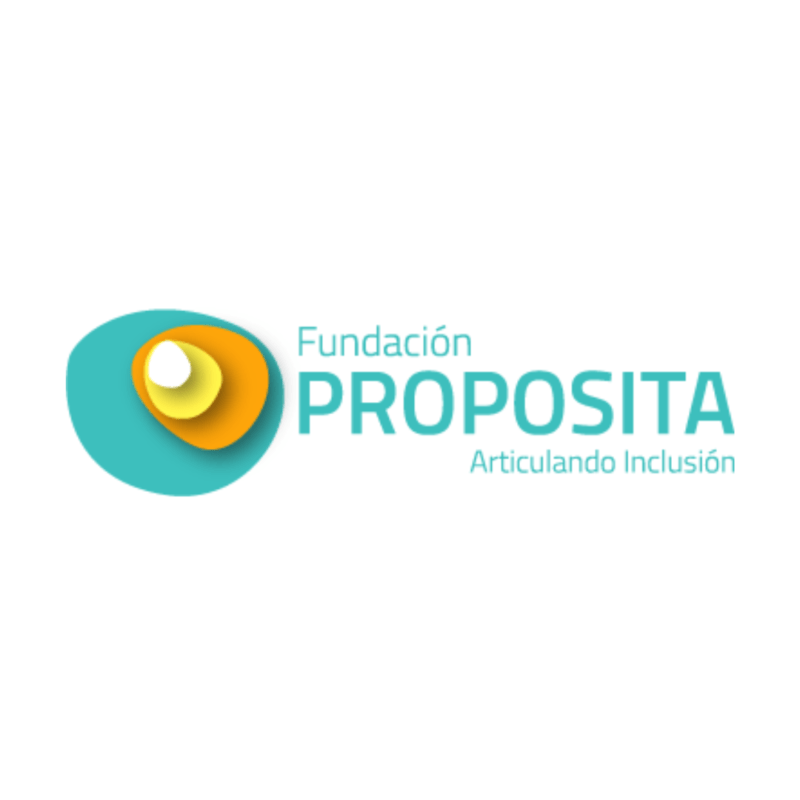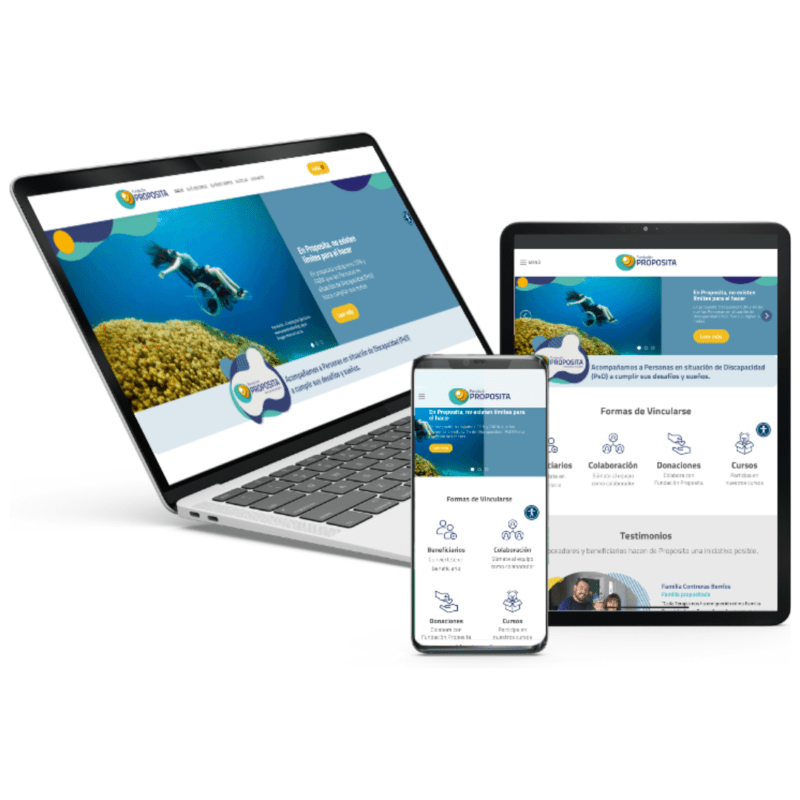It’s impossible not to love our work when every day we meet extraordinary people and brands. This month’s guest it’s one of them: Fundación Proposita. Our Hall of Fame will show you the human face behind this noble non-profit foundation and how they aim to improve the inclusion of people with disabilities.
It is admirable to have the conviction of wanting to change one’s person world, and to try to do it with all those who are invisible, is even more so! These heroes are: Fundación Proposita, an organization that looks for ways to achieve an equitable and inclusive world. Get to know them!
Big step towards inclusion

In 2021, María Ignacia Sáez Agurto (occupational therapist by profession) created Fundación Proposita to support people with disabilities fulfill their purposes, challenges, goals and dreams. The foundation was able to come into being during the COVID-19 health crisis and the emphasis on digital connectivity of that time. This helped them to reach people from all over Chile.
This non-profit organization is based on collaborative and multidisciplinary work, bringing together professionals from different areas to meet the challenges and purposes of people with disabilities. Collaboration between different professionals, caregivers and individuals it’s one of their fundamental pillars. Only this way, barriers can be broken down.
In Proposita determination is a key element since they have the conviction to achieve inclusion for all people. This non-profit organization oversees making visible, educating and designing an inclusive society. Nowadays, the team has grown considerably, and they hope to continue to do so with the same motivation as the first day.
YOPPEN: How was the idea of Fundación Proposita born, and why did you decide to name it that way?
MARÍA IGNACIA: The idea was born many years ago. I am an occupational therapist and have worked many years in rehabilitation. In the hospital I saw many needs that were not fulfilled by the State. So that’s where the idea came from, looking for different ways to guarantee, within our reach, the best to people with disabilities.
I will always mention the concept “people with disabilities”, it’s important to clarify that, because that is the right term. We should always refer to the person first and the disability second.
As I was mentioning, I observed different problems within the health system and created a startup to try to help. Everyone was so supportive about it and they loved the project. But being able to finance the projects, which were very expensive, was very difficult.
In general, people with disabilities are impoverished. Because they must stop working or they have access to jobs with lower salaries. And not only them, but also their family. There is usually a person who became their caregiver (for the person with disability), so usually this person is also impoverished.
So, for me it was important to be able to reach all the people who need it. What could be better than being able to help from this foundation? That’s where Proposita was born, basically to support this startup. To be able to look for ways of finance so people could have access to our help and projects.
M: Why Proposita? It was difficult to choose a name. After a long time, we were able to agree on it. At the end, what we do is to help and accompany people to find or achieve their purpose. Proposita came from the word propósito (purpose) in Spanish, and it seemed like a good fit. We don’t talk about helping people achieve their dreams, that sounds idyllic, unrealistic.
We didn’t want this project to be unrealistic. We needed realism, to help people with their day-to-day problems. “They amputated my hand and I want to play violin”; “I want to take care of my roses, but I can’t because I’m in a wheelchair”. And so many other things that sometimes seem very far away, very difficult to achieve but that we can do.
And why Proposita and not propósito? We believe it is important to understand the feminine as a rather sensitive, loving, democratic, non-hierarchical gaze. That is the feminine aspect of our organization and Proposita fits that better.
Y: Amazing! Along with this startup and the search for funding, who were the people behind the foundation from the beginning? Any special mentions?
M: It was difficult to put the team together, and it’s difficult to explain why, due to the depth of our work. Felipe Cabezas, who is the foundation’s commercial director it’s working with us since the days at the hospital. There are industrial designers who work with us that are very important to me. For they develop the most complex products, tailor-made for people with disabilities. Carolina, who is an occupational therapist and a colleague of mine, also believed in the project.

And so many other people have been supporting us in different ways. Depending on the project they join.
Y: So, people are switching depending on the direction of the project?
M: Of course, let me put things in perspective: if a person wants to play violin, we will probably need an expert in that area. A violin teacher who knows the exact movements or the specific requirements. Versus, for example, a person who wants to surf, in that case we can work with a surf coach.
The industrial designer is always part of the team. They will generate these processes; or product development with us. Our methodology is based on the needs of the person.
Y: How has Proposita changed since the beginning? We imagine that the creative processes and methodologies have changed
M: At the beginning… Well, I come from a clinical area. I had no idea about administration or the steps to found Proposita. For the first few months that was my focus. Structuring this foundation alongside Felipe. We were writing the statutes, doing all the paperwork. So, the first part was very administrative.
After that we kept on changing. We analyze different ideas until we reach our three areas of development. Obviously, we are very open to continuing expanding if necessary. We are a new organization; we are about to celebrate our first anniversary. So, we still can modify some aspects if required.
Y: So, it’s evolving.
M: Yes, the methodologies particularly. We have always worked with a structured methodology, but it keeps expanding to accommodate our needs. It has also been nurtured by other methodologies. The idea is to be able to validate it later to be our own Proposita methodology.
Y: So, are you still finding the right method to approach the more complex job?
M: The most complex task is the financing! And it has to do with the fact that Chile is not well prepared in this area. Foundations or donations are not part of our idiosyncrasy. I mean, we may donate some money sometimes, but it is not part of our habits. And the Chilean legislation does not allow us to have these habits either.
In Europe, for example, one can make donations and pick where our taxes go. For example, if I want to “save the pandas”, part of my taxes can go there. So, it’s different. In Chile taxes are paid to the State and they see how it is distributed.
Y: Are there any particular achievements or cases you would like to share with us?
M: How difficult! I don’t really like to personify because each process is very personal. But, for us being able to accompany different people is very important. A very simple example: a person who wants to stand up, so they are able to see their full body in the mirror, see how their clothes fit…to be able to help them to fulfill that “dream” or purpose, that’s what matters to us.
I remember a little boy with a complex head injury that needed a skull protector so he could walk around safely. He was a basketball fan and after we were able to make the protector, he was able to play basketball, go to school, and many other activities. The most beautiful thing is that it’s not only a change for the person but for their environment as well.
It is not only him who is happy, but also his parents, his siblings, his teachers, his classmates and more. These actions generate a lot of happiness. It is like a drop of water that falls and begins to generate this shock wave that is almost infinite. Those are Proposita results.
That’s priceless! To make a person happy. Especially those who are invisible, it’s not something we talked about enough as a society or that one knows how to relate to. In general, people with disabilities are more socially hidden.
Y: Besides, we imagine that you help different cases…
M: Yeah, they are always different. Each project is a person because it is tailor-made. We can have two people who have the same health condition and need absolutely different things. So, the development of the product or the whole process has to do more with the particular need of that person, that with their health condition.
We also work in other areas, such as counseling or education. The foundation has also expanded the methodology a little so other professionals or people who work closely with people with disabilities can use this perspective in their own interventions or accompaniment.
But the idea is that it should be custom-made because everyone it’s different.
Y: On the education side, are you looking to reach professionals or people in general?
M: It depends… We have done specific courses for professionals who work directly with people with disabilities. But it’s quite diverse, people from health, education and more social careers also participate in other instances.
We have also worked with formal and informal caregivers. Since they live with people with disabilities every day, they know their specific needs. Maybe not prototypical, but perhaps they invented something that helped that person. Working with them has been nice.
It’s very important to take caregivers into account because they are the ones who know the most, even more than the specialists and doctors themselves. No matter how much you can offer, sometimes things just don’t work, and they are the first ones to tell you. These are extremely important factors to consider.
Y: How have the social changes of recent years impacted Fundación Proposita?
M: The foundation was born in this critical period, well, it was born when it had to be born. It was the middle of the pandemic, but I think there were positive aspects. We were able to work from all over the country because we started to use more online work.
Before the pandemic, everything was face-to-face, but now it’s different. We had a project in La Serena, another in Puerto Montt and everything was synchronous, but virtual. I think that was very important, to be able to build a team and reach places that other ways we won’t be able to reach, that was very important for me.
And of course, the complications of the pandemic. Obviously, the resources will be prioritized, the focus was on COVID. Chile’s social outbreak happened months prior. So, there was a super important crisis from the economic point of view. The funds that were available to non-profit organizations were all destined to these areas.
So, of course it was complex. But since we were just starting out, we were able to adapt quickly.
Y: It’s important that you were able to connect with other regions.
M: For me it was very important to continue the work in other regions. I did not wish to stay just in the capital, because I know there are many needs. And the more distant or extreme the area, there’s also less access.
So, being able to get there and reach people with disabilities is also important. One of our future goals is to keep on growing.

Y: Is there any curiosity or anecdote about Fundación Proposita that you can share with us?
M: Well, I think I told you about the logo. It took months to find the right one. It was hard to make the decision! I also love aesthetics and design, so I wanted it to be perfect.
And the logo has to do with the shock wave I mentioned before. It represents how a concrete act is going to help a person and how this affects the communities. But it also means collaborative work, which are the fundamental pillars for us.

Also, like the apachetas (piles of rocks that were usually offerings for the gods) usually made in the desert. The idea is to build and generate a balance, the stones are all different in shape but in very specific positions they can continue to grow upwards.
If you look at the logo from above, you can see an apacheta and a water shockwave. And I think it manages to project our identity. All shapes are different like human beings, and the idea is to highlight these concepts that are very important to us.
One person with a disability is different from another, just as I am different from others. We are all different and this is a tremendous value! Together we can do wonderful things, but we must be willing to do so.
Y: What has your experience with YOPPEN been like?

M: From the beginning it has been very pleasant. Felipe, the commercial director, had been working on other projects with Ny and she didn’t hesitate for a second in wanting to work with us. Everything was super organized! Very fluid and very organic. I think they were able to understand us, especially my more complex ideas. They were able to bring all the things that were important for our organization to our website.
We don’t have a physical space now. We are working online, and we travel to the places around, to the places where we are doing projects.
So, the website is our home! It was very important that we could gather everything that we are. These months working with YOPPEN were fluid, organic and loving. Alexandra was always available to help us with each correction.
I am absolutely grateful, and I consider you a part of this organization. YOPPEN is helping people access these stories and the activities we do. So, you are part of it, and you are helping us to make visible this need that is so important, that we recognize each other with our differences and that we can live together in a mutual space. I am very grateful!




